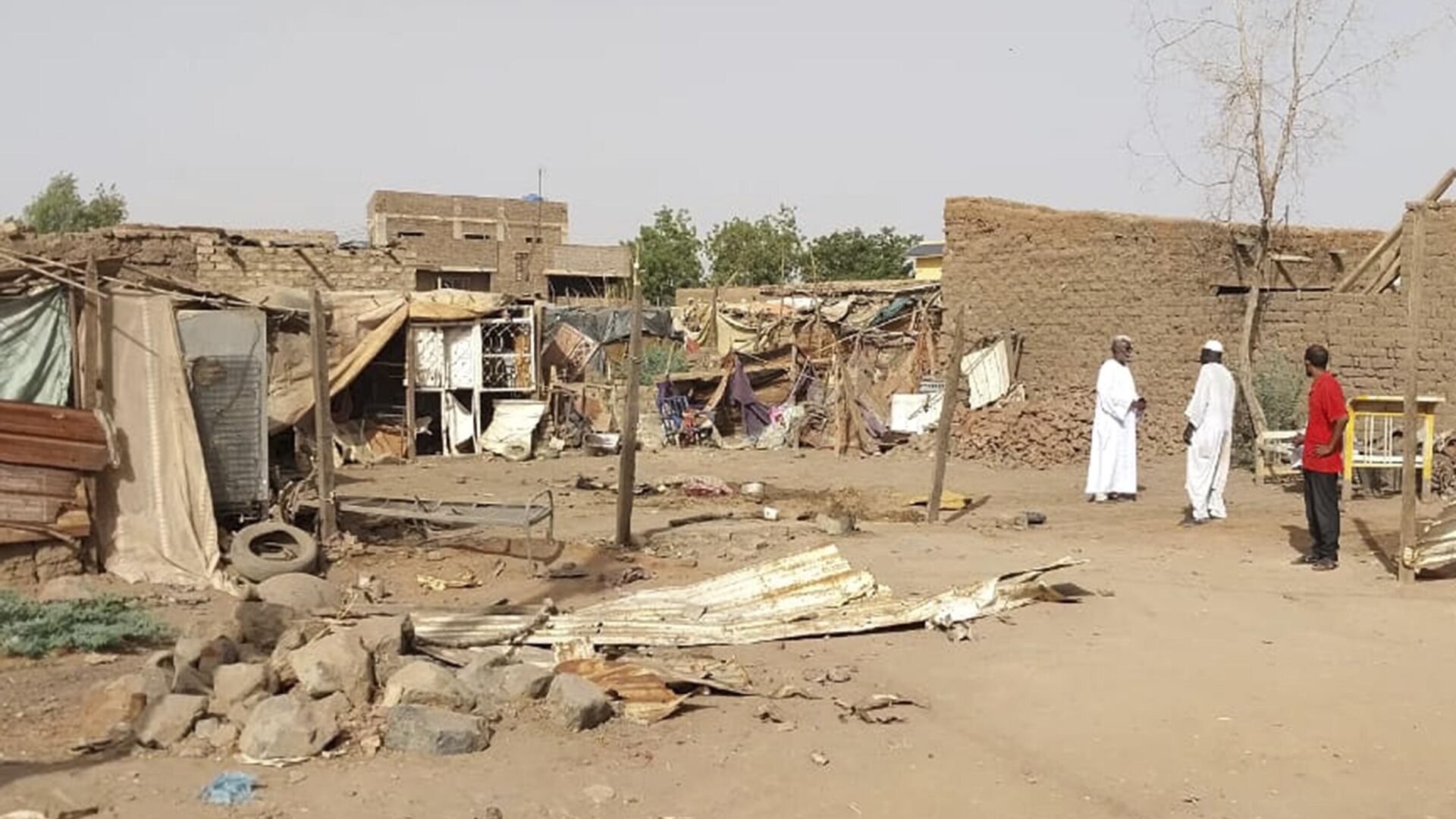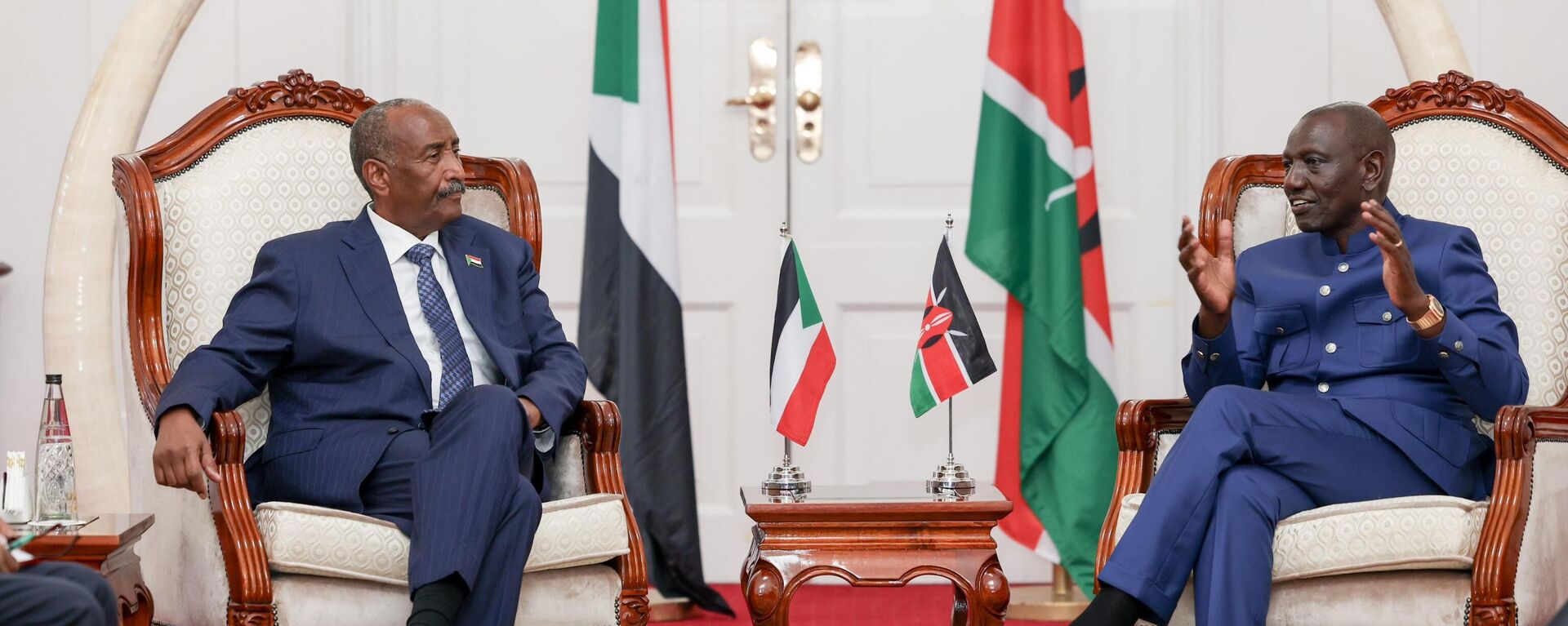https://en.sputniknews.africa/20231210/sudanese-warring-parties-agree-to-sign-cessation-of-hostilities-deal-igad-secretary-1064052992.html
Sudanese Warring Parties Agree to Sign Cessation of Hostilities Deal: IGAD Secretary
Sudanese Warring Parties Agree to Sign Cessation of Hostilities Deal: IGAD Secretary
Sputnik Africa
On December 9, Djibouti hosted a summit of the Intergovernmental Authority on Development (IGAD), which brought together the leaders of Djibouti, Ethiopia... 10.12.2023, Sputnik Africa
2023-12-10T16:29+0100
2023-12-10T16:29+0100
2023-12-10T16:29+0100
armed clashes in sudan
sudan
north africa
mohamed hamdan dagalo
omar ismail guelleh
abiy ahmed
djibouti
ethiopia
intergovernmental authority on development (igad)
rapid support forces (rsf)
https://cdn1.img.sputniknews.africa/img/07e7/06/12/1060004365_0:160:3072:1888_1920x0_80_0_0_8aef9bafebc83bb965a8e32d65b95696.jpg
Chairman of the Sovereign Council and head of the Sudanese army, Abdel Fattah al-Burhan, and leader of the Rapid Support Force (RSF), Mohamed Hamdan Dagalo, have agreed to sign a cessation of hostilities agreement, IGAD Executive Secretary Workneh Gebeyehu announced.According to the declaration adopted at the summit, Mohamed Hamdan Dagalo, the leader of the Rapid Support Forces opposed to the army, agreed to the IGAD ceasefire proposal in a telephone call.The letter, which was posted on social media pages and groups affiliated with the militant group, proposed an initial 30-day ceasefire with the possibility of an extension. According to Dagalo, a permanent ceasefire would depend on a final political agreement. In addition, Dagalo stressed that the National Congress Party, the former ruling party under President Omar al-Bashir, as well as affiliated parties and members who have "obstructed democratic transition," should be excluded from the political process.For his part, army head al-Burhan said in his speech that a peaceful solution to the Sudanese crisis is possible if three priorities are achieved: adherence to the Jeddah Declaration on Humanitarian Principles, the signing of a ceasefire agreement, and the removal of all obstacles to humanitarian access.President Ismail Omar Guelleh of Djibouti, who chaired the meeting, described the rapid implementation of the ceasefire as an important prerequisite for the start of a viable process to restore hope and peace in Sudan.Apart from that, Ethiopian Prime Minister Abiy Ahmed said that Addis Ababa remains committed to supporting a peaceful resolution to the conflict. Somali President Hassan Sheikh Mohamud also spoke, noting that the summit also addressed broader issues of regional peace and security initiatives.Violent clashes between the Sudanese army and the paramilitary group Rapid Support Forces began in April. Clashes between the military forces later spread to other Sudanese regions. Since then, the parties to the conflict have introduced a number of temporary nationwide ceasefires, but none of them have helped to resolve the conflict.According to the UN, the ongoing conflict has displaced more than 2.5 million people and killed about 300,000.
https://en.sputniknews.africa/20231114/sudans-army-chief-meets-kenyan-president-to-explore-options-to-speed-up-peace-talks-1063541367.html
sudan
north africa
djibouti
ethiopia
east africa
Sputnik Africa
feedback@sputniknews.com
+74956456601
MIA „Rossiya Segodnya“
2023
Maxim Grishenkin
https://cdn1.img.sputniknews.africa/img/07e7/0a/17/1063018107_0:0:1104:1103_100x100_80_0_0_03090c85a11f5d2e8a19cf1d989443c9.jpg
Maxim Grishenkin
https://cdn1.img.sputniknews.africa/img/07e7/0a/17/1063018107_0:0:1104:1103_100x100_80_0_0_03090c85a11f5d2e8a19cf1d989443c9.jpg
News
en_EN
Sputnik Africa
feedback@sputniknews.com
+74956456601
MIA „Rossiya Segodnya“
Sputnik Africa
feedback@sputniknews.com
+74956456601
MIA „Rossiya Segodnya“
Maxim Grishenkin
https://cdn1.img.sputniknews.africa/img/07e7/0a/17/1063018107_0:0:1104:1103_100x100_80_0_0_03090c85a11f5d2e8a19cf1d989443c9.jpg
sudan, north africa, mohamed hamdan dagalo, omar ismail guelleh, abiy ahmed, djibouti, ethiopia, intergovernmental authority on development (igad), rapid support forces (rsf), east africa
sudan, north africa, mohamed hamdan dagalo, omar ismail guelleh, abiy ahmed, djibouti, ethiopia, intergovernmental authority on development (igad), rapid support forces (rsf), east africa
Sudanese Warring Parties Agree to Sign Cessation of Hostilities Deal: IGAD Secretary
On December 9, Djibouti hosted a summit of the Intergovernmental Authority on Development (IGAD), which brought together the leaders of Djibouti, Ethiopia, Kenya, Somalia, and the Sudanese army chief, Abdel Fattah al-Burhan, to discuss the security in the North African country, which has been the scene of armed confrontations since April.
Chairman of the Sovereign Council and head of the Sudanese army, Abdel Fattah al-Burhan, and leader of the Rapid Support Force (RSF), Mohamed Hamdan Dagalo, have agreed to sign a cessation of hostilities agreement, IGAD Executive Secretary Workneh Gebeyehu announced.
"The Assembly effectively secured a commitment from the Sudanese belligerents to promptly convene & agree upon a cessation of hostilities—a crucial step in addressing the aspirations of the Sudanese people!" he wrote on X (Formerly Twitter).
According to the declaration adopted at the summit, Mohamed Hamdan Dagalo, the leader of the Rapid Support Forces opposed to the army, agreed to the IGAD ceasefire proposal in a telephone call.
The letter, which was posted on social media pages and groups affiliated with the militant group, proposed an initial 30-day ceasefire with the possibility of an extension. According to Dagalo, a permanent ceasefire would depend on a final political agreement. In addition, Dagalo stressed that the National Congress Party, the former ruling party under President Omar al-Bashir, as well as affiliated parties and members who have "obstructed democratic transition," should be excluded from the political process.
For his part, army head al-Burhan said in his speech that a peaceful solution to the Sudanese crisis is possible if three priorities are achieved: adherence to the Jeddah Declaration on Humanitarian Principles, the signing of a ceasefire agreement, and the removal of all obstacles to humanitarian access.
He also warned against foreign interference in the situation in Sudan, noting that only the state should have a monopoly on the use of force.
President Ismail Omar Guelleh of Djibouti, who chaired the meeting, described the rapid implementation of the ceasefire as an important prerequisite for the start of a viable process to restore hope and peace in Sudan.
"Silencing the guns in Sudan is not a choice; it is an absolute necessity to avoid further suffering and the possible collapse of this great nation," Guelleh said, as quoted by state media.
Apart from that, Ethiopian Prime Minister Abiy Ahmed said that Addis Ababa remains committed to supporting a peaceful resolution to the conflict. Somali President Hassan Sheikh Mohamud also spoke, noting that the summit also addressed broader issues of regional peace and security initiatives.
Violent clashes between the Sudanese army and the paramilitary group Rapid Support Forces began in April.
Clashes between the military forces later spread to other Sudanese regions. Since then, the parties to the conflict have introduced a number of temporary nationwide ceasefires, but none of them have helped to resolve the conflict.
According to the UN, the ongoing conflict has displaced more than 2.5 million people and killed about 300,000.



